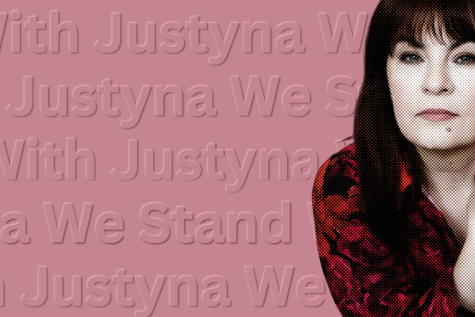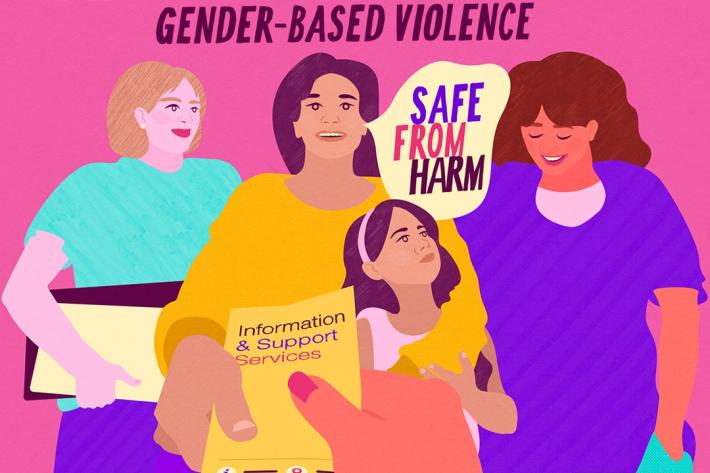Latest press releases
A selection of stories from across the Federation

Poland
Poland: Justyna Wydrzyńska’s Trial to Continue – A Shameful Blow to the Fight for Reproductive Rights
Today, instead of delivering justice, the court prolonged the legal persecution of Justyna Wydrzyńska by ordering a retrial.
For media inquiries


| 09 June 2023
IPPF EN condemns Member States' failure to back EU action against rape
Today the EU Council agreed a preliminary position on the European Commission’s bold proposal for an EU Directive to Combat Violence Against Women and Domestic Violence. IPPF EN deeply regrets that the Council’s General Approach reveals a decision by Member States to cut from the draft law a requirement for all EU countries to criminalise rape using a strong and harmonised definition based on the absence of consent by the victim*. The progressive definition in the European Commission’s proposal was fully aligned with the Istanbul Convention, to which the EU recently acceded after years of stalling by national governments. "Women, girls and minorities across the EU face widespread sexual violence, and this goes largely unpunished. It is inexcusable that the Council has today failed to find the political will to take effective action against rape. Member States are jeopardising a unique opportunity for the EU to adopt a law that guarantees equal rights for all women and girls to access justice and live safe from sexual violence," says Camille Butin for IPPF EN. Member States and the European Parliament will need to reach an agreement on the final text of the Directive in the coming months. MEPs are expected to support the European Commission’s proposal to harmonise the criminalisation of rape.

| 14 March 2023
Poland: IPPF EN is appalled by the guilty verdict in the case of Justyna Wydrzyńska
Today, the District Court in Warsaw found Justyna Wydrzyńska guilty for helping a woman in an abusive relationship to access abortion pills. She was sentenced to eight months of community service for 30 hours/month and will now have a criminal record. "We are deeply saddened by the decision and outraged by the entire process. Condemning a person for an act of empathy and compassion towards another human being is unconceivable. We are in awe of Justyna’s bravery in the face of 18 months of judicial persecution by an apparatus targeting anyone who dares challenge the state’s immoral attacks on healthcare and human rights", said Irene Donadio of the International Planned Parenthood Federation, European Network (IPPF EN).

| 25 October 2022
Polish prosecutors indict women’s human rights defenders and plan to go ahead with another sham trial
Three leading women’s rights defenders are facing eight years in prison in Poland for exercising their right to peaceful protest. Prosecutors in Warsaw filed the indictment against Marta Lempart, Klementyna Suchanow and Agnieszka Czerederecka-Fabin of the Polish Women’s Strike (Ogólnopolski Strajk Kobiet, OSK), a partner of the International Planned Parenthood Federation, European Network, for allegedly organizing protests during the COVID-19 pandemic. Massive protests were prompted back in October 2020 by the decision of the illegally appointed Constitutional Tribunal to impose a near-total ban on abortion care. Peaceful protesters were met with excessive force, with authorities using tear gas, pepper spray and physical assault. Now, two years on, women human rights defenders (WHRDs) are still being attacked by Polish authorities, with defenders facing violence from law enforcement and far-right groups, including bomb threats, as well as smear campaigns in state-controlled media, detention and excessive criminal charges orchestrated and encouraged by the government. In the case of the Polish Women’s Strike’s members, these charges include “causing an epidemiological threat”, endangering public health and publicly praising crimes. The new indictment against the women’s rights defenders came just days before the second anniversary of the near-total ban on abortion, which has killed six women so far. It also comes in the same month that a court hearing was held in the trial of Justyna Wydrzyńska. Justyna, a member of Abortion Without Borders and the Abortion Dream Team, is facing up to three years in prison for facilitating an abortion that didn’t happen. Her case marks the first in Europe where a WHRD is being prosecuted for helping ensure abortion care by providing abortion pills. Justyna’s trial is ongoing. Irene Donadio of the International Planned Parenthood Federation, European Network, said:

| 16 September 2022
We condemn the forced ban on the EuroPride march in Serbia
On August 28, Serbian President announced that the EuroPride march in Belgrade planned for September 17 would not go ahead. Two days ago, the Serbian police instead announced a ban on the route for the parade, which had already been agreed between the organisers of Pride and the Serbian authorities. IPPF EN and IPPF Member Associations from Serbia (Center for population policies and sustainable development -CPPSD), Norway (Sex og Politikk) Romania (SECS – Contraception and Sexual Education Society) and North Macedonia (HERA - Health Education and Research Association) stand with Serbian LGBT and human rights activists in condemning the banning of the LGBT march event as a huge blow for human rights. The parade, due to take place this weekend, was cancelled amid fears that counter protests could turn violent. The atmosphere of fear, threats of violence and numerous serious acts of discrimination which are illegal and punishable - have reached a peak and achieved their goal. A ban on fundamental rights such as freedom of assembly and freedom of speech in the public space is a threat for all of us as citizens and for our capacity to operate as civil society organisations serving groups marginalized by systemic oppression. Banning the LGBT march at a time when ultra-nationalist and far-right groups are tolerated to express hatred and contempt against this minority in the streets of Belgrade will intensify hate crimes and hate speech and fuel violence. Not only are the national authorities clearly failing to respect their obligations under human rights law to ensure freedom of assembly for all citizens, but they also fuel anti-LGBTI rhetoric which puts LGBTI people and community at increased risk of violence. This is a very sad day for Serbia, and not one, but one hundred steps back for human rights in this country. It is more important than ever in these difficult times to stand in solidarity with the LGBT community in Serbia and not allow artificially designed gaps between the majority and this minority to deepen. We will be present at the Pride March in Belgrade on Saturday and call on the Serbian authorities to respect their national and international obligations in ensuring the security of the participants during and at the end of this march for human rights. Press contact: Antonio Mihajlov from Sex og Politikk, [email protected], +4740633704 or [email protected]. Photo by Mercedes Mehling on Unsplash.

| 15 September 2022
Abortion care: Hungary’s heartless move will humiliate and harm women
IPPF condemns the Hungarian government’s issuing of a decree that, from 15 September, will force women seeking abortion care to listen to the embryonic cardiac activity before being able to access fundamental healthcare. This requirement has no medical purpose and serves only to humiliate women. It will make accessing abortion more burdensome. The new legislation was issued as a fait accompli by the government in Hungary without any expert or public consultation and without hearing from women. Under Hungarian law, abortion care is available in the first 12 weeks of pregnancy on medical grounds or if the pregnant woman is in severe crisis. This new decree is the latest in a series of measures imposed by the government to undermine women’s autonomy. For example, dissuasive and intrusive mandatory counselling sessions have also been imposed on women seeking abortion care, with the sole result of humiliating and undermining their emotional health. This new legislative act from Viktor Orban’s government is shocking, but it is a development that women rights defenders in Hungary have already feared for some time, given the government’s disregard for women’s dignity and health and for democracy. IPPF joins our Hungarian partners in calling for the government to stop harassing women, and take urgent and effective measures that support contraceptive access and relationships and sexuality education, together with ensuring social policies that empower people to live freely. “As in Poland, it is tragic to see EU citizens paying the price, as their mental health, intimate lives and freedom are sacrificed on the altar of a government’s ultra-conservative agenda. Orban’s government knows very well that Hungarian public opinion is in favour of reproductive rights and that is why it is trying to chip away incrementally at women’s self-determination,” said IPPF European Network’s Irene Donadio. Media contacts: Irene Donadio, IPPF EN: 0032 (0)491 719 390 - [email protected] ; [email protected] Nőkért Egyesület, Women’s Association, Hungary: 0036 70 620 2168 - [email protected] Julia Spronz, Patent, Hungary: [email protected] Illustration by: Olga Mrozek for IPPF x Fine Acts

| 14 July 2022
Poland: Trial drags on of rights defender accused of helping abuse survivor to access abortion
As today’s hearing in the trial of human rights defender Justyna Wydrzyńska is postponed until October 14, we ask Poland’s Justice Ministry to immediately drop the charges against Justyna and stop oppressing woman rights defenders (WRDs). Justyna is charged with supporting Ania, a woman in an abusive relationship, to access abortion pills. A survivor herself of a similar situation to Ania, she took compassionate action to help the woman. Justyna’s efforts were reported to the police by the controlling husband. Ania was denied abortion care, but the stress caused her to miscarry. Now, Justyna, a member of Abortion Without Borders and the Abortion Dream Team, is facing up to three years in prison for facilitating an abortion that didn’t happen. Her case marks the first in Europe in which a WRD is being prosecuted for helping ensure abortion care by providing abortion pills.
Pagination
- First page
- Previous page
- …
- 2
- 3
- 4
- …
- Next page
- Last page

















